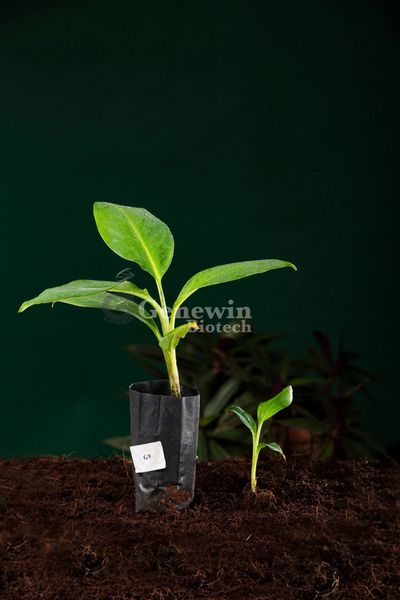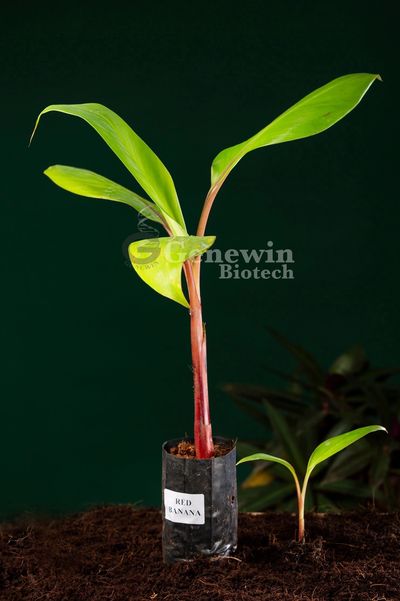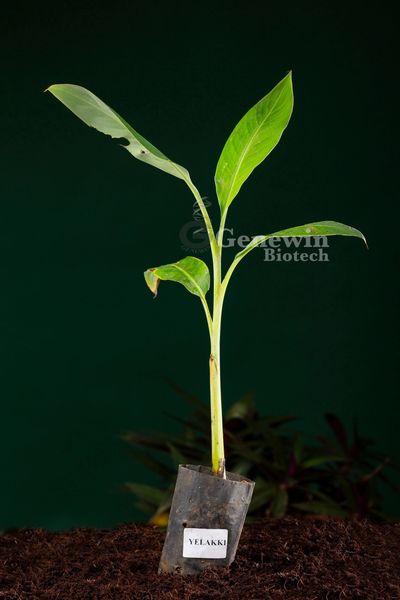- Krishnagiri, Tamil Nadu
- GST NO. : 33AAGFG9833P1ZT
- +91-8940444777, +91-9894393578
Banana Tissue Culture Plants
Leading Manufacturers, Exporters and Wholesaler of Grand Naine G9 Banana Tissue Culture Plant, Red Banana Tissue Culture Plant and Yelakki Tissue Culture Banana Plant from Krishnagiri.
MOQ : 1 Piece
| Business Type | Manufacturer, Exporter, Supplier |
| Country of Origin | India |
| Other Necessities | Well Watered |
| Suitable For | Farm |
| Variety | G-9 |
| Soil Specific | Well Drained |
| Fertilizer | Organic Fertilizer |
Preferred Buyer From
| Location | Worldwide |
G9 Banana - Grand Naine
G9 is one of the most commonly cultivated Cavendish bananas. These are the high yielding plantain among all the banana varieties which is introduced to India from Israel. It is the solid green fruit with high export value and economically highly profitable producing 16 hands and 16 fingers consisting of 225-250 fruits per plant. This variety has good wind resistance and excellent landscaping potential. Matured height of the G9 is 6-8 feet. The size of G9 fruit is 41 mm usually which is the preferred size for export. Length of the fruit is 10.5 – 11’’; Girth of the fruit is 5.5 – 6”.
Origin
Israel
Soil Type and Preparation
Land with good drainage facility can be chosen for the cultivation of banana saplings. Red soil and other moderate soil with less amount of sand proportion will be suitable soil for banana plants. The pH of the soil should be neutral or between 5.5 -7.5. Thus, the soil should be subjected to the soil test in a suitable laboratory or government based horticulture labs to confirm the pH of soil. If the soil is more acidic, it is to be neutralized using the gypsum and if the soil is more basic, neutralize it with Dolomite. This neutralization is very important to make the soil suitable for the cultivation.
Planting Season
Tissue cultured plants are not season dependent. They can be planted to the soil throughout the year. The Major difference between the normal and the tissue cultured plants is that Tissue cultured plants will have twice the number of roots that are present in the normal plants. This unique property gives the plant the strength and good nutrient absorbing capacity thus gives good yield to an average of 30 – 55 kg/ bunch.
Planting Distance
6 feet x 6 feet
Plants Per Acre
1200 Plants
Approx. Harvest Time
10 months
Advantages of Tissue Culture Plants
- True to the type
- Synchronous flowering
- High market value
- High yield and quality
- Early Maturity
- Free from all diseases at the time of supply
- Throughout the year plantation possible
- Uniform growth of fruits
MOQ : 100 Piece
| Business Type | Manufacturer, Exporter, Supplier |
| Other Necessities | Well Watered |
| Suitable For | Farm |
| Variety | Red Banana |
| Soil Specific | Well Drained |
| Fertilizer | Organic Fertilizer |
Preferred Buyer From
| Location | Worldwide |
Local Name
- Sevvazhai (Tamil)
- Chovazha, Chenkadali (Malayalam)
- Lāl kélā (Hindi)
- ChandrabaLe (Kannada)
Origin
India
Soil Type and Preparation
Land with good drainage facility can be chosen for the cultivation of banana saplings. Red soil and other moderate soil with less amount of sand proportion will be suitable soil for banana plants. The pH of the soil should be neutral or between 5.5 -7.5. Thus, the soil should be subjected to the soil test in a suitable laboratory or government based horticulture labs to confirm the pH of soil. If the soil is more acidic, it is to be neutralized using the gypsum and if the soil is more basic, neutralize it with Dolomite. This neutralization is very important to make the soil suitable for the cultivation.
Planting Season
Tissue cultured plants are not season dependent. They can be planted to the soil throughout the year. The Major difference between the normal and the tissue cultured plants is that tissue cultured plants will have twice the number of roots that are present in the normal plants. This unique property gives the plant the strength and good nutrient absorbing capacity thus gives good yield to an average of 15 – 35 kg/ bunch.
Planting Distance
7 feet x 7 feet
Plants Per Acre
900 Plants
Approx. Harvest Time
12 - 15 months
Advantages of Tissue Culture Plants
- True to the type
- Synchronous flowering
- High market value
- High yield and quality
- Early Maturity
- Free from all diseases at the time of supply
- Throughout the year plantation possible
- Uniform growth of fruits
MOQ : 100 Piece
| Business Type | Manufacturer, Exporter, Supplier |
| Country of Origin | India |
| Other Necessities | Well Watered |
| Suitable For | Farm |
| Variety | Yelakki |
| Soil Specific | Well Drained |
| Fertilizer | Organic Fertilizer |
Preferred Buyer From
| Location | Worldwide |
Yelakki Banana Plant
Yelakki Banana is one of the most commonly cultivated commercial bananas especially in Tamil Nadu and Karnataka. It is the slender, medium tall plant bearing dark green fruits that turn golden yellow with highly fragrant, tasty, powdery and firm fruits. The plants bearing the fruits are smaller with prominent beak packed closely round the axis having a windblown appearance. Unripe fruits turn bright yellow upon ripening. The pulp of the fruit is ivory white in color. It is special for long transportation. The skin is usually thin but the flesh is sweet. It is capable of producing 10-14 hands and 12-15 fingers consisting of 100-150 fruits per plant. Matured height of the Yelakki Banana is 12 - 14 feet. The length of the fruit is 4-5’’.
Origin
India
Soil Type and Preparation
Land with good drainage facility can be chosen for the cultivation of banana saplings. Red soil and other moderate soil with less amount of sand proportion will be suitable soil for banana plants. The pH of the soil should be neutral or between 5.5 -7.5. Thus, the soil should be subjected to the soil test in a suitable laboratory or government based horticulture labs to confirm the pH of soil. If the soil is more acidic, it is to be neutralized using the gypsum and if the soil is more basic, neutralize it with Dolomite. This neutralization is very important to make the soil suitable for the cultivation.
Planting Season
Tissue cultured plants are not season dependent. They can be planted to the soil throughout the year. The Major difference between the normal and the tissue cultured plants is that Tissue cultured plants will have twice the number of roots that are present in the normal plants. This unique property gives the plant the strength and good nutrient absorbing capacity thus gives good yield to an average of 15 – 21 kg/ bunch.
Planting Distance
7 feet x 7 feet
Plants Per Acre
900 Plants
Approx. Harvest Time
10 - 12 months
Advantages of Tissue Culture Plants
- True to the type
- Synchronous flowering
- High market value
- High yield and quality
- Early Maturity
- Free from all diseases at the time of supply
- Throughout the year plantation possible
- Uniform growth of fruits



